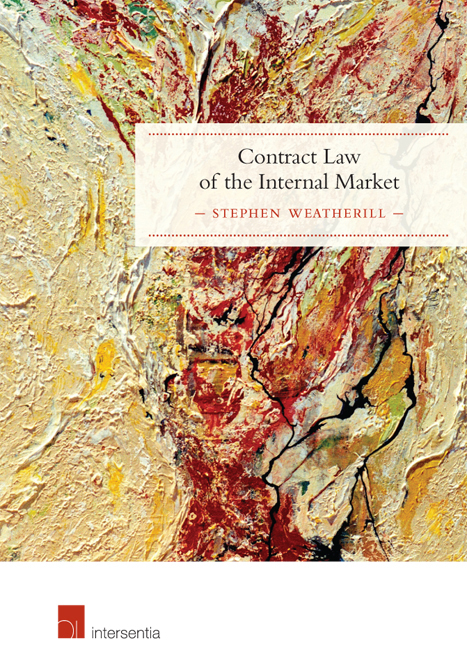Book contents
- Frontmatter
- Preface
- Contents
- Table of Cases: Alphabetical
- Table of Cases: Chronological
- Chapter 1 The Landscape of Contract Law in the EU
- Chapter 2 Contractual Autonomy and National Contract Law in the Internal Market
- Chapter 3 The EU as a Source of Contract Law
- Chapter 4 Themes and Principles in the EU's Contract Law Acquis
- Chapter 5 Improving the Regulatory Environment
- Chapter 6 Models of Harmonisation: Maximum or Minimum
- Chapter 7 Measuring the Effects of the Contract Law of the Internal Market
- Index
Chapter 5 - Improving the Regulatory Environment
Published online by Cambridge University Press: 19 September 2018
- Frontmatter
- Preface
- Contents
- Table of Cases: Alphabetical
- Table of Cases: Chronological
- Chapter 1 The Landscape of Contract Law in the EU
- Chapter 2 Contractual Autonomy and National Contract Law in the Internal Market
- Chapter 3 The EU as a Source of Contract Law
- Chapter 4 Themes and Principles in the EU's Contract Law Acquis
- Chapter 5 Improving the Regulatory Environment
- Chapter 6 Models of Harmonisation: Maximum or Minimum
- Chapter 7 Measuring the Effects of the Contract Law of the Internal Market
- Index
Summary
THE NEED FOR A POLITICAL AS WELL AS A LEGAL APPROACH
The story told in Chapters 3 and 4 is of the practical difficulty in making sharp and effective use of the promise of a limited role for the EU which is made by the principle of conferral contained in Article 5 TEU. Several features militate against the prosecution of a compelling constitutional case that the limits of EU legislative competence have been exceeded. Most of all, the internal market, to which legislative harmonisation adopted pursuant to Article 114 TFEU is dedicated, is in principle a limiting concept but in practice an empowering one. The threshold which must be crossed is low: the Court is reluctant to intervene in legislative choices provided the constitutionally necessary incantation of a contribution to the functioning of the internal market adorns the legislative measure's reasoning. Seen from the opposite standpoint, it is very difficult to make a plausible case against the validity of measures of legislative harmonisation, since it is so easy for a political preference to act to be endowed with the necessary sheen of constitutional respectability. The case law, examined in Chapter 3, duly reveals that most challenged measures survive attack before the Court.
The problem, then, lies in the limited worth of the currently applicable legal rules in giving substance to the corollary of the principle of conferral, which is that competences not conferred on the EU belong with the Member States. This is important enough to be made explicit twice in the common provisions at the beginning of the TEU, in Articles 4(1) and 5(2) TEU, but it is not backed up by operationally useful rules. The Treaty does not make explicit provision to exclude particular areas from the influence of the EU. In fact, by stark contrast, it is structured to grant functionally broad competences to the EU. Article 114 TFEU is the most supple of these, and, as explained in principle in Chapter 3 and explored in legislative practice in Chapter 4, it is a poor guardian of the notion of ‘States’ rights’ which seems to be promised by Articles 4(1) and 5(2).
Information
- Type
- Chapter
- Information
- Contract Law of the Internal Market , pp. 191 - 222Publisher: IntersentiaPrint publication year: 2016
